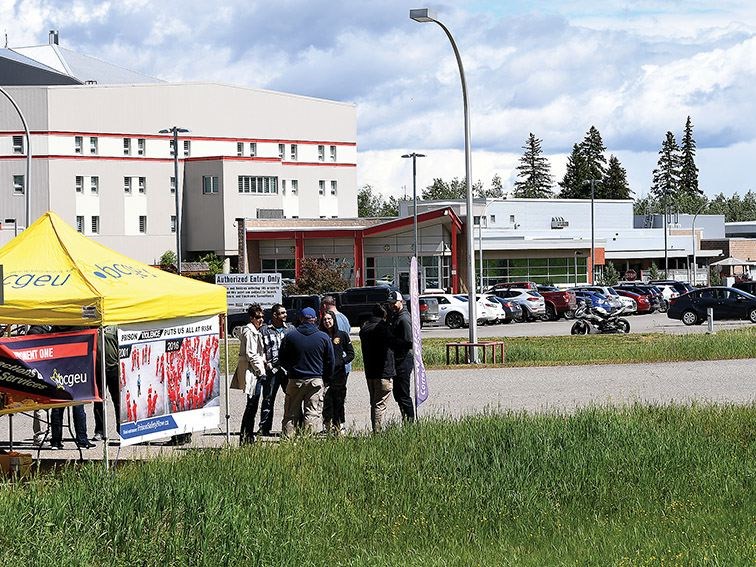A B.C. Government and Service Employee's Union representative was in Prince George on Tuesday as part of a province-wide tour to raise awareness about declining working conditions in B.C. jails.
Dean Purdy, chair of the BCGEU's correctional and sheriff services component met with guards outside Prince George Regional Correctional Centre where a rally was held to protest the situation.
He said attacks on guards have been on the rise over the last five years and, at 124 incidents, reached an all-time high among the B.C.'s 10 provincial jails in 2018. Fourteen of them occurred at PGRCC, according to Purdy.
In part, he pins the trouble on a change in 2002 to allow double-bunking in jail cells without a requisite increase in the number of guards. Where a guard was typically responsible for 20 inmates in a living unit, each must now keep an eye on 40 at PGRCC, Purdy said.
Double-bunking has also led to overcrowding.
"It's like too many chickens in the chicken coop. They start pecking at each other instead of the ground," Purdy said. "There isn't enough square footage. They're bumping into each other, there are only so many phones, there are only so many seats for eating, there are only so many showers."
He said about 60 per cent of the inmate population have mental health and addictions issues, which have only worsened matters.
"It's not only for the safety of the correctional officer, is about the safety of the inmates because the inmate-on-inmate violence has also gone up," Purdy said.
Recruiting and retaining guards has also become an issue according to Purdy, who said many are off work due to post-traumatic stress disorder while others soon move on to better-paying jobs, often as police officers.
"RCMP, municipal police forces, they scoop them up," Purdy said.
He said raising wages or the length of the work week would help. Jail guards in B.C. work a 35-hour week and Purdy said raising it to 40 hours while leaving the hourly pay untouched would increase income. Jail guards top out at just under $70,000 per year, he said.
Purdy said he has been encouraged by what he has heard from Public Safety Minister Mike Farnworth and ministry representative on the issue.
"We like what we're hearing. They have been very receptive to some of our suggestions around changing up the model of how we house inmates and moving existing staff around to get more corrections officers into the living units, because that's where everything happens," Purdy said.
In a statement, BC Corrections spokesperson Alicia Bertrand said guard safety is a top priority.
"Absolutely nothing matters more to us than having staff go home safe at the end of their shifts. That's why BC Corrections has made an unprecedented effort over the past three years to introduce new and innovative classification and case management approaches, as part of the overall risk assessment process, that we expect to have a significant impact on preventing violence."
She also said the vast majority of incidents occur in segregation units, often with two or three officers present on a unit at the time of an incident.
"This demonstrates that ratios do not change inmate behaviour or prevent violence," she said.
"Instead, new approaches, that are rooted in classification and case management such as implementing Right Living Units and Complex Needs Units for individuals who have challenging behaviours and/or a history of violence are helping to creating real change for staff and the individuals in their care."
WorkSafeBC, meanwhile, has initiated a provincial corrections inspectional initiative for 2019.
"We don't announce the specific locations of these inspections before they occur," WorkSafeBC spokesperson Erica Simpson said.

.png;w=120;h=80;mode=crop)

